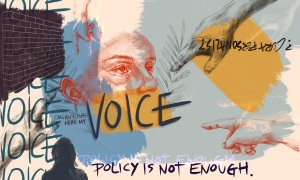CW: This article discusses sexual assault and harassment
Following the Department of Education’s 2020 release of new Title IX amendments, a 1972 law that prevents educational institutions from discriminating on the basis of sex, administrations are preparing to enact the new policies while keeping Georgetown’s Title IX reporting process as similar as possible to the current model.
The long-anticipated changes, released on May 6, include a series of alterations to Title IX policy that aim to increase the due process rights of students accused of sexual assault or harassment. The new rules, scheduled to be enacted Aug. 14, narrow the definition of sexual harassment to behavior “that is so severe, pervasive and objectively offensive that it denies a person access to the school’s education program or activity.” While administrators from universities across the nation, including Georgetown, have criticized Education Secretary Betsy DeVos’ policies in the past, the administration is working to incorporate mandated changes while maintaining much of the university’s sexual misconduct reporting process.
After a draft of the resolutions was released in Nov. 2019, Georgetown administrators held 11 listening sessions with the student body and submitted criticisms of the suggested changes to the Department of Education. Despite student and administrative pushback, the new guidelines include controversial policies such as requiring plaintiffs to be cross-examined by an attorney. DeVos’ policies additionally do not require universities to investigate reported assaults off-campus, such as in a private student residence or on a study abroad program.
Administrators and student facilitators met on July 6 to discuss the impact of the Department of Education’s 2020 amendments.
Title IX Coordinator and Director of Title IX Compliance Samantha Berner, Director of the Office of Student Conduct Judy Johnson, Assistant Director of the Office of Student Conduct Heather Kimball, and student facilitators Ben Telerski (COL ’23) and Katarina Watson (COL ’21) led a discussion to answer students’ questions about how the new regulations would alter Georgetown’s Title IX procedures.
Administrators explained that, despite some mandatory changes, the university plans to keep the reporting process as similar to the current model as possible.
“Our approach has been to change as little as possible and to maintain, to the extent we can, the processes that we have in place as we address all misconduct and all sexual misconduct we were previously able to address,” Kimball said.
The university will be required to use changed federal definitions for the terms sexual assault, dating violence, domestic violence, and stalking. While the changed definitions differ from the current model, administrators assured students that the same sexual offenses would remain prohibited. Behaviors not covered by the new regulations will be included under other terms in the code of conduct.
“I want to make it clear all conduct covered by the University sexual misconduct policy will continue to be covered under the new policy,” Berner said.
New policies will also allow universities to choose which standard of evidence they use. Under current Title IX law, cases must have a “preponderance of evidence” standard with an accused student found likely to be guilty of the assault. While universities may now raise the burden of proof and use a standard of “clear and convincing evidence” for hearings, Georgetown will continue to use the preponderance of evidence guidelines.
While 2011 Title IX guidelines recommended that a “typical investigation” be restricted to 60 days, the new policies offer no timeline. Despite concerns that drawn-out investigations place a long-term burden on survivors of sexual misconduct, university officials were unable to commit to a binding 60-day limit.
“I don’t feel it is helpful to commit to you now that we will meet all cases within 60 days and not be able to deliver on that promise,” Berner said. “We do our best to move these things forward but we also balance that with making sure that our investigation is thorough and that we are providing fair process to both parties.
One of the predominant criticisms of the new Title IX policies is the mandatory cross-examination of prosecuting students by an attorney. Students and administrators from across the country have raised concerns that cross-examination sacrifices the safety of the accuser and dissuades survivors to speak out about their assaults.
While Georgetown expressed concerns over required cross-examination to the Department of Education, it will still be required by the new regulations beginning Aug. 14. If a student does not have an advisor for cross-examination, the university will provide a representative at no cost to the student. The guidelines also offer options for alternative processes that would allow parties to come to an informal resolution. These options are being discussed by Title IX administrators, but will not be enacted until after the Aug. 14 deadline.
No contact orders will continue to be automatically issued during investigations to protect students who wish to seek legal action against an assaulter. The university will also aid students in transitioning housing or class situations as necessary. (https://symboliamag.com/) “We also have a policy within the code of student conduct that prohibits any sort of retaliation against an individual who is participating in our judicial process,” Johnson said. “We make it very clear that retaliation is not tolerated.”
The university is continuing to investigate sexual misconduct cases and hold hearings remotely through the COVID-19 pandemic, according to Johnson. While the 2020 guidelines require the university to shift Title IX procedure, administrators aim to maintain the same level of support for student survivors of sexual misconduct.
“Our guiding focus throughout is to make sure we are able to comply with these regulations but also that we are developing policies and procedures that meet the needs of the students,” Berner said. “We understand that community engagement particularly with you all as students is critical in ensuring that the changes we make reflect the values of our community.”
This article has been updated to reflect that the university will provide a representative for students without an advisor during cross-examination





Sarah,
I read your piece entitled “Administrators Address Changes to Georgetown’s Title IX Policy,” and you are an excellent writer. I am responding because there were several incorrect statements in the article, and I also wanted to make a few points.
1) The definition of sexual harassment in the new Rule that you provide in the second paragraph is incomplete and unintentionally misleading. The new sexual harassment definition actually has three prongs; the first is quid pro quo harassment, the second the one you identify, and the third sexual assault, dating and domestic violence, and stalking. Although it is technically correct to refer to the new definition as narrower than the old one, the definition of sexual harassment in the new Rule is also much more reasonable and encompassing and will eliminate false, frivolous, and ridiculous claims that don’t rise to the level of true sexual harassment. This is a good thing.
2) In the next paragraph, you imply that the cross-examination in the live hearing must be conducted by an attorney. This is not so. Cross examination is conducted by the advisor of choice, which could be, but is not necessarily, an attorney.
3) You are correct that off campus assaults will not require mandatory investigations. This is, of course, consistent with the wording of Title IX and in accord with the Davis versus Malone County School Board Supreme Court decision of 1999. DeVos was wise to ally the administration of Title IX compliance with Supreme Court precedent in this regard.
4) The federal definitions of sexual assault, dating violence, domestic violence, and stalking can be found in the Jeanne B. Clery Act of 1990. It’s federal law, and it is good to have one definition of these unlawful activities across all 4,500 institutions of higher education.
5) The preponderance of evidence standard has caused a lot of problems, but it is the standard that is used for schools’ compliance with other civil rights laws, e.g., Title VII. I oppose its use because it precipitates erroneous outcomes. Many universities will have difficulty applying this standard to students if the burden of proof standard for offending faculty and staff is higher, as it is in many schools. The DeVos rule mandates that the standards of proof for sexual harassment and sexual violence be the same for student, faculty, and staff respondents, which is only fair. I would recommend a higher burden of proof, but not many people are amenable.
6) In the fifth paragraph from the bottom, you talk about prosecuting students. Resolving a Title IX dispute is not supposed to be a prosecution but rather an investigation.
One thing that your article does not make clear and is not apparent to many folks is that Title IX is about access to education and specifically equal access to education. It is not about sexual assault, survivors, or justice. Sexual assault and justice are only relevant if they impede access to education.
Full disclosure, I am a former Professor, liberal, Democratic, feminist, and an ardent supporter of Betsy DeVos’ new rule. It’s a huge improvement.
Buddy Ullman, Ph.D.
Former Professor of Biochemistry and Molecular Biology
The Oregon Health & Science University
Email: buddyullman26@gmail.com